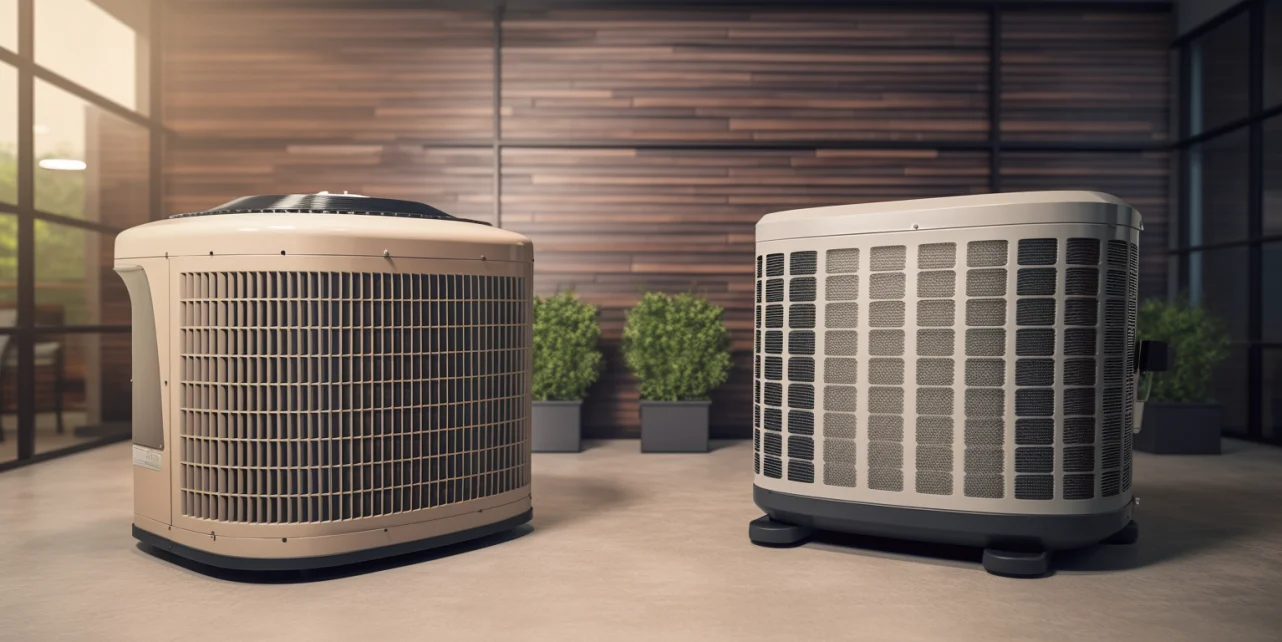There are many different factors to consider when comparing central air conditioner units. First and foremost, it’s important to determine the size and cooling capacity you need for your home. This will be measured in BTUs (British Thermal Units) and will vary depending on the square footage of your house. It’s important to choose a unit that is powerful enough to effectively cool your home without being too large and therefore wasting energy and money.
Another important factor to consider is the energy efficiency rating of the unit. This is measured in SEER (Seasonal Energy Efficiency Ratio) and the higher the number, the more efficient the unit will be. A higher SEER rating will result in lower energy bills, but may come with a higher upfront cost for the unit.
Additionally, you’ll want to consider the noise level of the unit. Nobody wants to be constantly disturbed by a loud air conditioner. Look for units with a lower decibel level for a quieter and more peaceful home.
Some air conditioner units also come with additional features such as programmable thermostats, which allow you to control the temperature and schedule of your unit for optimal efficiency. Other features to consider are air purifiers, dehumidifiers, and smart home capabilities.
It’s also important to research the brand and read reviews from other customers. You want to choose a unit from a reputable brand and one that has a good track record for reliability and customer satisfaction.
Lastly, cost and installation should also be taken into consideration. Compare prices from different brands and make sure to factor in the cost of installation. You may also want to consider warranties and maintenance plans offered by the manufacturer.
In summary, when comparing central air conditioner units, pay attention to the size and cooling capacity, energy efficiency rating, noise level, additional features, brand reputation, cost and installation. By considering all of these factors, you can make an informed decision and choose the best central air conditioner unit for your home.
Size and Capacity
When it comes to comparing central air conditioner units, the size and cooling capacity are crucial factors to consider. This is because you want to ensure that the unit you choose is powerful enough to cool your home effectively, but not too large that it results in unnecessary energy consumption.
The size and capacity of an air conditioner unit are measured in BTUs (British Thermal Units). The higher the BTU rating, the greater the cooling power of the unit. This means that a larger home will require a unit with a higher BTU rating, while a smaller home can function well with a unit with a lower BTU rating.
It’s important to accurately determine the size and cooling needs of your home before making a decision. This can be done by calculating the square footage of your house and consulting with an HVAC professional who can recommend the appropriate BTU rating for your specific needs.
Choosing a unit with the right size and cooling capacity will not only ensure efficient cooling but also save you money on energy bills. A unit that is too large will cycle on and off frequently, wasting energy, while a unit that is too small will have to work harder to cool your home, resulting in higher energy consumption.
Energy Efficiency
Another important factor to consider when comparing central air conditioner units is the energy efficiency rating. This is measured in SEER (Seasonal Energy Efficiency Ratio) and indicates how efficiently the unit can cool your home. The higher the SEER rating, the more efficient the unit will be.
A more efficient unit will result in lower energy bills, saving you money in the long run. However, keep in mind that a higher SEER rating may come with a higher upfront cost for the unit. It’s important to weigh the initial cost against potential long-term savings to determine the most cost-effective option for your budget and needs.
Not only is energy efficiency beneficial for your wallet, but it’s also better for the environment. Choosing a more efficient unit means reducing your carbon footprint and contributing to a greener world.
In addition to the SEER rating, you can also look for other energy-saving features such as programmable thermostats and smart home capabilities. These allow you to control and schedule the temperature and operation of your unit, resulting in even greater energy efficiency.
It’s important to note that regular maintenance and proper usage can also impact the energy efficiency of your unit. Be sure to follow manufacturer recommendations for maintenance and use your unit efficiently to maximize its energy efficiency rating.
By choosing an energy-efficient central air conditioner unit, you not only save money but also help to reduce your environmental impact. Consider all factors, like SEER rating, to make an informed decision for your home and the planet.
Noise Level
While the cooling ability and energy efficiency of a central air conditioner unit are important considerations, so is the noise level. Nobody wants to be constantly disturbed by a loud and bothersome air conditioner, especially if it’s located near bedrooms or living spaces.
When comparing central air conditioner units, be sure to look at the decibel level (dB) listed in the unit’s specifications. The lower the dB, the quieter the unit will be. A unit with a low dB rating is ideal for maintaining a peaceful and comfortable home environment.
It’s also important to consider the location of the unit within your home. A unit that is installed on the outside of your home, such as in a backyard or on the side of your house, will typically be less intrusive. However, if the unit is located closer to living spaces, such as on a balcony or near a bedroom, noise level becomes an even more important factor to consider.
Some units also come with noise-reducing features, such as insulated compressor compartments or variable speed fans. These can help to reduce noise levels and create a more soothing and peaceful atmosphere.
Additional Features
In addition to the size, energy efficiency, and noise level, there are other features to consider when comparing central air conditioner units. These features can enhance the overall performance and convenience of the unit, providing a more comfortable and efficient cooling experience.
One important feature to consider is an air purifier. These can help to remove pollutants, allergens, and other contaminants from the air, promoting better indoor air quality. This can be especially beneficial for those with allergies or respiratory issues.
Dehumidifiers are another useful feature to consider. They help to remove excess moisture from the air, creating a more comfortable and healthier environment. This can also be beneficial for preventing mold and mildew growth, which can be harmful to both your health and the structure of your home.
Some central air conditioner units also come with smart home capabilities. This allows you to control and monitor your unit remotely through a smartphone or other home automation system. This can be a convenient and efficient way to manage your unit, especially when you’re away from home.
Other features to consider include advanced fan controls, zoning options, and multi-stage compressors. These can all contribute to a more customized and efficient cooling experience for your home.
Brand Reputation and Cost Factors
When comparing central air conditioner units, it’s also important to consider the brand reputation and cost factors. These can greatly impact your overall satisfaction with the unit and the longevity of its performance.
Brand reputation can be determined through researching the company’s history, customer reviews, and ratings. It’s important to choose a unit from a reputable brand with a good track record for reliability and customer satisfaction. This can provide peace of mind and assure you that you’re investing in a quality product.
Cost is also a significant factor to consider. While you may be tempted to choose the cheapest option, it’s important to remember that the initial cost is not the only expense you’ll incur. Consider the long-term costs, such as energy bills and maintenance, to determine the most cost-effective option for your budget.
It’s also important to include installation costs when considering the overall cost of the unit. Some brands offer installation services, while others require you to find and hire a professional installer. Be sure to research and compare installation costs to get the best deal.
Finally, consider the warranties and maintenance plans offered by the manufacturer. These can provide added protection and support for your unit and can help save money in case of any unexpected issues.
Key Takeaways
When comparing central air conditioner units, it’s important to consider the size and cooling capacity, energy efficiency, noise level, additional features, brand reputation, cost, and installation. Make sure to choose the right size and capacity, as well as a high SEER rating. It can ensure efficient cooling and save money on energy bills. Noise level should also be taken into consideration, as well as additional features like air purifiers and dehumidifiers. It’s essential to choose a unit from a reputable brand with a good track record and factor in long-term costs, including installation and maintenance. By considering all of these factors, you can make an informed decision and choose the best central air conditioner unit for your home.







